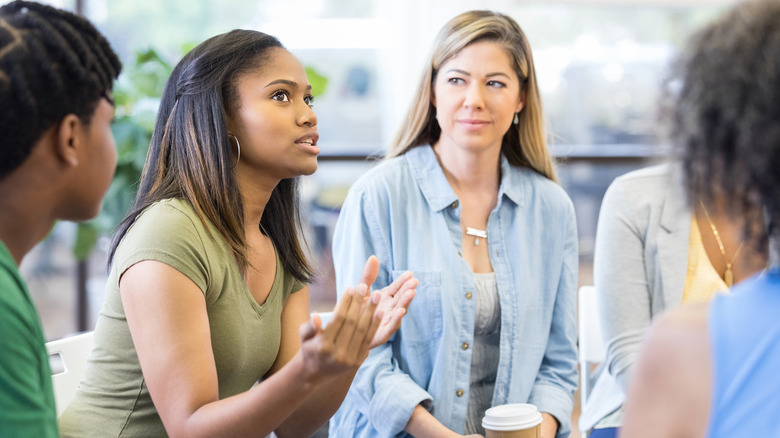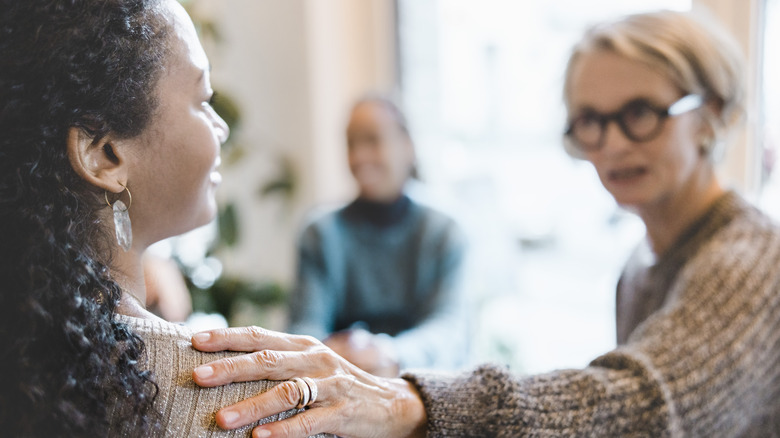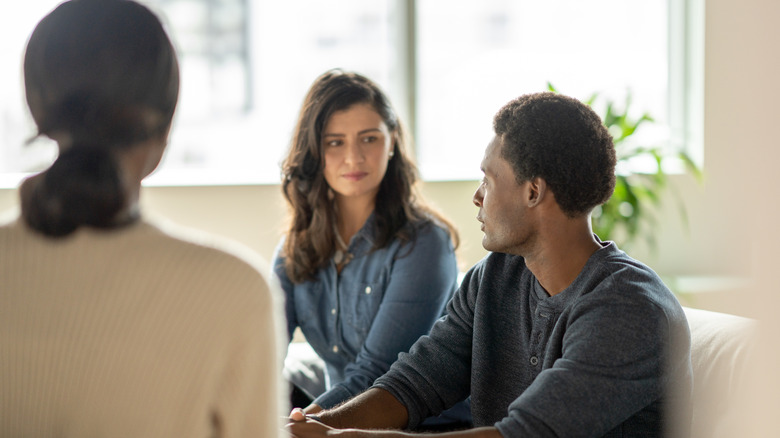What Is Peoplehood, The Trending Vulnerability Workshop?
Founded by Elizabeth Cutler and Julie Rice, who also founded popular spin class SoulCycle, Peoplehood is a workshop for those who want to improve their communication skills and connect with like-minded people. "We thought if we could provide structure and the scaffolding for people to connect with others and really listen to them and their own voices, that there was something potent in that," Cutler told Refinery29. "There is a real need for social health — for relational health — and this is a great way to access that."
The main basis of a session is to listen to others, though you're expected to share your own troubles too. According to Peoplehood's website, there can be up to 20 people in a 60-minute session (which, if you ask us, seems like quite a lot of people to be vulnerable around). During a session, each group will be led through some breathwork and light stretching before everyone shares their names and a current fact about themselves. Next, a couple more questions are answered as a group before people get split into pairs to answer more prompts. A session finishes with another group prompt and some music.
The purpose of a session is to leave feeling freer, which means being open is par for the course. It may sound jarring to bare your soul to strangers, but could a Peoplehood session be the best therapy for you?
The concept could use some work
Well, before you book onto a session, there's some things you should know. Firstly, each Peoplehood session may be led by a guide, but these guides are not mental health professionals. Per The New York Times, Rice claims that Peoplehood guides go "through a very thorough training process," and "practice many weeks before they are put on the schedule." However, the fact is that these guides simply don't have professional mental health training, which could cause problems like conversation veering in a direction that members of the group are uncomfortable with or a guide struggling to keep control of a situation.
Moreover, counseling psychology professor Dr. Jerrold Shapiro told NYT that being a group therapist is "complex and intricate." He also warned of the dangers of what could be considered a group therapy setting without the presence of a counselor and said that groups like Peoplehood's sessions are "pushing boundaries, which, from a professional standpoint, is scary."
Another potential issue is the concept of active listening. When attending a session, Anna Medaris, a writer for Insider, shared that she technically broke the rules by giving feedback on what her partner told her instead of just listening. However, as psychiatrist Dr. Jessi Gold pointed out, someone just listening to you instead of responding to what you are saying could be counterintuitive and make you feel self-conscious. Asking questions or repeating what someone has said could help them to feel more understood.
Peoplehood veers dangerously close to presenting itself as therapy
Though it does not class itself as so, the layout of Peoplehood is similar to group therapy, which can be a highly effective tool. Speaking to the American Psychological Association, licensed psychologist Martyn Whittingham, PhD, stated that group therapy is considered "a triple-E treatment, which means it's effective, it's equivalent to individual therapy for most conditions, and it's efficient."
Additionally, Jennifer Silvershein Teplin, founder of Manhattan Wellness, revealed that speaking to a group of people about your issues can definitely be beneficial. "I find that there are a lot of collective experiences that no one is talking about. And when you can share what you are going through and someone else says, 'Oh my god, me too!' I believe there's such a powerful moment of connection. That's why group can be so great — it makes us feel less alone in our existence," she shared with Refinery29.
Overall, a Peoplehood session is marketed as a place where you can "change old habits or build new connections," which sounds nice on the surface but also puts the Peoplehood model into more tenuous territory. It could be the place for you to leave feeling spiritually and physically lighter from getting things off your chest. However, much like Dr. Shapiro pointed out, unleashing your trauma onto strangers without a mental health professional in the room could be at best, awkward, and at worst, dangerous.


